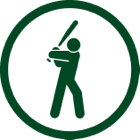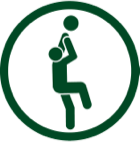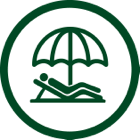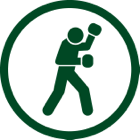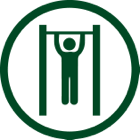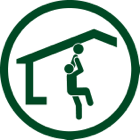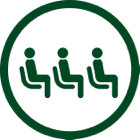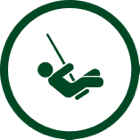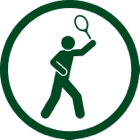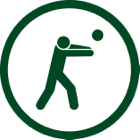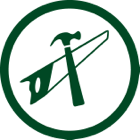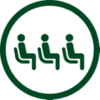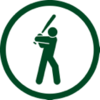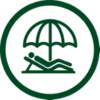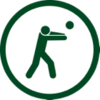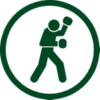Loyola Park
Located in the East Rogers Park community (adjacent on the west to Sheridan Road, abutting Loyola University’s property to the south, and Lake Michigan on the east), Loyola Park sits on 40.87 acres of land. The large fieldhouse is equipped with two gymnasiums, woodshop, boxing center and clubrooms for rental. Outside, the park offers a senior baseball and a softball field, a two-hoop basketball court, sand volleyball courts, four tennis courts, a playground, as well as a nearly 2/3-mile walking trail along the beautiful beach and Lake Michigan. Beach season begins the Friday before Memorial Weekend and goes through Labor Day.
With a great diversity, and quantity, of programs: there’s something for everyone at Loyola Park! Parents will appreciate the opportunity for their tots / preschoolers to increase their socialization skills in programs such as: kiddie college, tot spot, tiny tot and recreational-tumbling. Loyola Park is one of the sites for the popular park kids after school program for youth; Winter and Spring break camps are available during days when school is out.
Recreation for youth includes: baseball, basketball, boxing, cheerleading, cross-country, and gymnastics, hip hop dance, seasonal sports, soccer, softball, track & field, and volleyball. Our pre-teens and teens can make new friendships in their age-appropriate clubs. Other teen programs include: baseball, basketball, boxing, cheerleading, drop-in, flag football, hip hop dance, soccer, and volleyball. During the summer, Loyola Park offers various camps for youth.
Loyola Park is also noted for its Special Recreation programs for people with disabilities—including training for Special Olympics, after school Park Kids, summer camp for children and teens.
Adults and/or seniors are not forgotten; they can enjoy low-impact aerobics, conditioning, cross training, yoga, boxing, and volleyball.
On the cultural side, Loyola Park offers arts & crafts and woodcraft. Synapse Arts offers ballet and hip-hop dance classes as well as a hip-hop performance troupe. Chicago Tap Theatre offers tap classes for kids to adults.
Loyola Park is the home of artist Lynn Takata’s “Windform”: a 100’ long abstract concrete sculpture, which is meant to represent the movement of the water--and provides areas for patrons to sit and enjoy the lake, as well as slopes for children to climb and play on.
Loyola Park hosts a bounty of annual special events throughout the year. Boxing Show and Halloween Party, Black History Month Celebration, Family Valentine Dance, Earth Day Park Clean-up, Gym Showcase, and the Father’s Day-weekend Artists of the Wall Festival are among the community favorites!
Loyola Park was the sole park created by the North Shore Park District, one of 22 independent park boards consolidated into the żě˛ĄĘÓƵ in 1934. Unlike most of these park boards, the North Shore District, formed in 1900, was at first interested only in enhancing the area through boulevard improvements along Sheridan Road, Pratt Boulevard, and Ashland Avenue. By 1905, however, public pressure had prompted the district to consider park development. The district spent several years mulling its options. Finally, in 1909, at the urging of the Rogers Park Woman's Club, the North Shore District determined to concentrate its resources on purchasing land for a single beachfront park and boating basin known as North Shore Park. Shortly thereafter, noted landscape architect and engineer O.C. Simonds developed plans for a pier at the site, but these were never realized. Between 1912 and 1924, the North Shore District had acquired more than nine acres of lakeshore property. A small fieldhouse, built in 1923, soon provided game and club rooms. Playfields were flooded for ice skating in winter; in 1929, the local American Legion post erected a shelter house for skaters.
Several years after the żě˛ĄĘÓƵ took over in 1934, local residents asked that North Shore Park be renamed. The Park District agreed, and held a contest to choose a new name. Neighborhood residents favored the name Loyola Park, for nearby Loyola University. The Jesuits began to develop this important Rogers Park institution in 1906, when they purchased a 20-acre site between Devon and Loyola Avenues. During the 1930s, the university raised its neighborhood profile substantially by constructing a number of dramatic Art Deco buildings, including the Madonna della Strada Chapel. From 1948-1949, the żě˛ĄĘÓƵ acquired more land and more than doubled the size of Loyola Park and built a new fieldhouse with an adjacent grandstand. Streets were vacated in 1950 to further expand the park. Land acquisition was completed after another half-acre was added in 1971, bringing the size of Loyola Park to more than 40 acres.
Metered parking is available in two nearby lots. .
For directions using public transportation visit .
Contact: Jennifer Walling, President
Contact Email: jenniferwalling@gmail.com
Meetings: 1st Monday of the month at 6:30pm.
Facilities at Loyola Park
Programs at Loyola Park
Each Wednesday,Friday from 1pm to 2:30pm
Except the following dates:
Friday, Sep 26, 2025
Friday, Nov 28, 2025
Each Monday from 4:15pm to 5pm
Each Monday,Wednesday,Friday from 12:30pm to 2:30pm
Each Saturday from 1pm to 3pm
Except the following dates:
Saturday, Nov 29, 2025
Saturday, Dec 27, 2025
Saturday, Jan 3, 2026
Each Saturday from 9am to 11am
Except the following dates:
Saturday, Nov 29, 2025
Saturday, Dec 27, 2025
Saturday, Jan 3, 2026
Each Saturday from 11am to 1pm
Except the following dates:
Saturday, Nov 29, 2025
Saturday, Dec 27, 2025
Saturday, Jan 3, 2026
Each Monday,Wednesday from 7:30pm to 9pm
Each Tuesday,Thursday from 4pm to 5pm
Except the following dates:
Thursday, Nov 27, 2025
Each Tuesday,Thursday from 5pm to 6:30pm
Except the following dates:
Thursday, Nov 27, 2025
Each Tuesday from 4pm to 5pm
Pagination
Each Tuesday,Wednesday,Thursday from 4:30pm to 6:30pm
Each Monday,Tuesday,Wednesday,Thursday,Friday from 3pm to 6pm
Each Monday,Tuesday,Wednesday,Thursday,Friday from 3pm to 6pm
Each Monday,Tuesday,Wednesday,Thursday,Friday from 3pm to 6pm
Each Monday,Tuesday,Wednesday,Thursday,Friday from 3pm to 6pm







